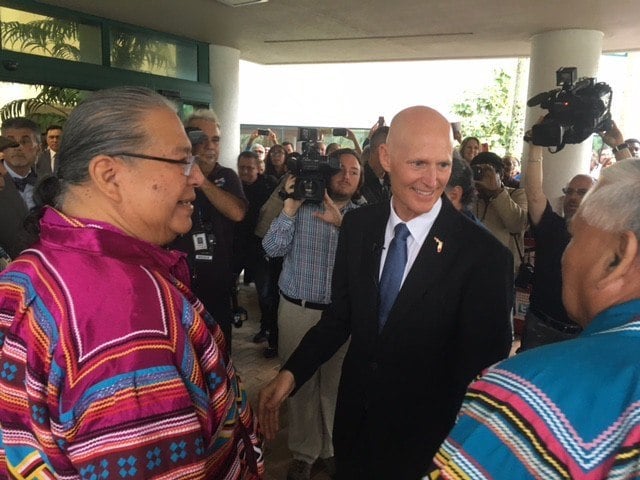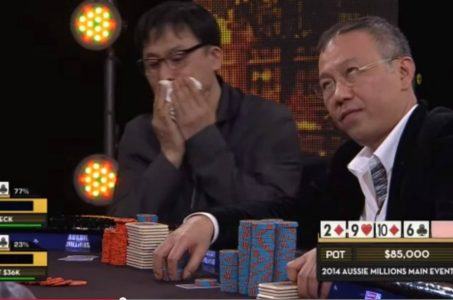Florida Seminoles Gambling Deal with Governor Rick Scott Draws Ire in State Legislature
Posted on: February 16, 2016, 05:30h.
Last updated on: February 16, 2016, 05:31h.

The Florida Seminoles gambling agreement reached with Governor Rick Scott (R) is laboring its way through the state legislature, but with just four weeks remaining to pass an accord, time is becoming of utmost importance.
In December, Scott announced he had reached a momentous 20-year deal with the Seminoles that would guarantee the state $3 billion over the next seven years. In exchange for the monies, the tribal organization would retain exclusive rights on house-banked card games at its seven land-based casinos and would also be afforded the right to operate live dealer craps and roulette table games.
The Seminoles’ former contract with the state expired in October, but the tribe’s casinos are continuing to operate.
March 11th is the 60th and final day of the Florida Legislature Regular Session. It also marks the deadline for lawmakers in Tallahassee to reach a gambling compact with the Seminoles for the remaining nine months of the year.
The Politics Shuffle
Before Scott’s compromise with the Florida tribe can become official, the state Senate and House of Representatives must first approve the terms. Like most things in politics, that’s been no easy task.
The Republican-controlled Senate and House are concerned with the Seminoles gaining additional exclusivity rights and the fact that the bill would prevent the state from authorizing other forms of gambling near Seminole-controlled venues.
Scott differs from many of his conservative Sunshine State constituents in that he isn’t adamantly opposed to gambling expansion. The governor’s deal would also incorporate the “decoupling” of greyhound and horse racetracks to allow pari-mutuel venues to run card rooms and slot machines, even without any actual racing being held.
The Florida Greyhound Association and Florida Thoroughbred Breeders’ & Owners’ Association both adamantly oppose decoupling, as it would further hurt their already struggling industries.
Calling the deal “a bunch of crap(s),” NoCasinos.org, a Florida political advocacy group, said in a statement that “the Seminole Compact was sold to Floridians as a firewall against the further expansion of gambling … Unfortunately, the new compact would not just explode gambling at tribal facilities, but across the state as well.”
Sharing of the Green
State Sen. Rob Bradley (R-District 7) and State Rep. Jose Diaz (R-District 116) are being entrusted with finding common ground and authoring a gambling compact that will be favorable in the eyes of both legislative chambers, as well as with Scott and the Seminoles.
Diaz believes affording the Seminoles what they want, as well as granting concessions to “racinos,” is the best path forward. Diaz’s main goal is to make sure politicking doesn’t cause the state to lose the billions of dollars at stake.
“The numbers are indeed staggering. Money that can go to education and health care and critical infrastructure,” he told the Panama City News Herald.
In the meantime, Seminole casinos are still sending payments to Tallahassee as if the old agreement never expired, and the state continues accepting and cashing the checks.
That might seem confusing to some, but it’s par for the course in the game of politics.
Related News Articles
Adelson Dealt Blow in “Foul-Mouthed” Libel Case
Developing Targeting East Hartford for Connecticut Casino
MGM Japan to Open in 2025, CEO Jim Murren Hints
Most Popular
LOST VEGAS: The Foster Brooks Robot at MGM Grand
Bally’s Sets Date for Tropicana Las Vegas Implosion & Party
Most Commented
-
VEGAS MYTHS RE-BUSTED: You Don’t Have to Pay Resort Fees
— August 2, 2024 — 16 Comments -
VEGAS MYTHS RE-BUSTED: Elvis Was a Straight-Up Racist
— August 9, 2024 — 11 Comments -
ANTI-SOCIAL BEHAVIOR: Vegas Casino Buffet Stunt in Poor Taste Goes Viral
— August 16, 2024 — 7 Comments -
VEGAS MYTHS RE-BUSTED: The Strip Tried Appealing to Families and Failed
— August 23, 2024 — 7 Comments
















No comments yet